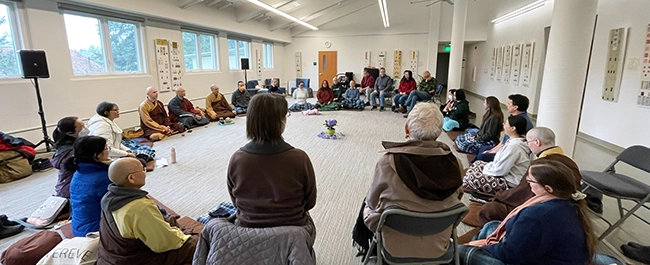Written by Bhikshu Jin Chuan, Bhikshu Jin Wei, and Wade Chang
Chinese Translated by Linda Wang
比丘近傳、比丘近威、 張峻榮 文 王林梅 中譯 VBS 659
From March 29 – April 5, 2025, we had the honor of hosting Dharma Master Yanzhen. As a college student at Beijing University, he was deeply influenced by the teachings of Venerable Master Xuyun, Elder Master Guangqin, and Venerable Master Hsuan Hua, as well as the bowing journals of Reverend Heng Sure and Dharma Master Heng Chau (Dr. Martin Verhoeven). His final decision to become a monk came from reading a line of teaching from Master Hua’s Dharma talks. His own teachers, Venerable Master Manjue and Venerable Master Yicheng, were disciples of Venerable Master Xuyun and inherited the Weiyang Chan lineage.
2025年3月29日至4月5日,我們有幸接待衍真法師的來訪。法師早年就讀於北京大學,他深受虛雲老和尚、廣欽老和尚、宣化上人的教法影響,亦從恒實法師與恒朝法師(馬汀•維荷文博士)的朝山日記中深受啟發。最終促使他出家的契機,是讀到宣化上人一場開示中的一句話。他的師父滿覺長老和一誠長老是虛雲老和尚的法子,繼承了溈仰宗法脈。
Dharma Master Yanzhen took novice ordination in 1993 and full Bhikshu ordination in 1994 at True Suchness Monastery. In 2000, he was asked to facilitate the revival of Jiangxi Buddhist Academy. Today, with over 30 years in the monastic life, he serves as Vice President of Jiangxi Buddhist Academy and Abbot of Baofeng Chan Monastery.
衍真法師於1993年在真如寺受沙彌戒,1994年受具足戒成為比丘。2000年,他受命協助復辦江西佛學院。如今,他僧臘已逾三十載,現任江西佛學院副院長兼江西靖安縣寶峰鎮寶峰禪寺住持。
During his visit to the City of Ten Thousand Buddhas, Dharma Master Yanzhen expressed his deep respect and gratitude to Master Hua for his teachings and inspiration. When he visited the Wordless Hall to pay respects to the sharira of Buddha Shakyamuni, Venerable Master Xuyun, and Venerable Master Hsuan Hua, he was moved to tears. Later, he visited classes at Dharma Realm Buddhist University where he saw lively conversations around the meaning of the Sutra texts.
在萬佛聖城參訪期間,衍真法師深切表達了對宣化上人教法啟迪的尊敬與感恩。當他在「無言堂」頂禮釋迦牟尼佛、虛雲老和尚與宣化上人的舍利時,深深感動至落淚。隨後,他前往法界佛教大學旁聽課程,見到師生們圍繞著經典的義理展開熱烈討論的場景。
Dharma Master Yanzhen emphasizes the importance of integrating scholarship and practice. For many years, he has taught the pure regulations of Chan monasteries and has supported the revival of traditional Chan Session practices in over ten monasteries and Buddhist academies across China. Meanwhile, he equally values the study of Theravada Buddhist teachings such as the Visuddhimagga and Abhidhamma. He finds that these Theravada texts serve as a solid foundation for Dharma practice grounded in the Noble Eightfold Path.
衍真法師強調「學修並重」的重要性,他長期從事禪宗寺院清規的教學,曾經幫助國內十餘座寺院或佛學院恢復傳統的禪七規矩。同時,他也重視南傳佛教教理的學習,如《清淨道論》和《阿毘達摩》等。他認為這些典籍能為八正道的修行奠定紮實的基礎。

During his visit to Abhayagiri, he shared, “As disciples of the Buddha, regardless of our country, language, or tradition, we are all connected through the shared foundation of the Noble Eightfold Path.” He compared this to the redwood trees, whose roots form a vast underground network: when one tree is weak, others can send nourishment through their roots. He returned to this metaphor again and again, seeing in the spirit of the redwoods a reflection of the Dharma community worldwide.
在無畏寺參訪時,他說:「身為佛弟子,無論來自哪個國家、持何種語言或宗派傳統,我們都因八正道這一共同的基石而彼此相連。」他以紅木樹為喻,其根系在地下交織出巨大的網絡:若一株羸弱,其它紅木樹便透過根脈為其輸送養分。法師一再回到紅木樹的比喻,他看到紅木精神恰似全球佛法共同體的映照——根系相連,彼此滋養。
Dharma Master Yanzhen also visited Redwood Vihara where he taught us the simple act of washing hands. He asked, “Has anyone washed their father’s hands or helped him bathe before?”
衍真法師也拜訪了紅木禪林,在這裡他親身示範「洗手」這項簡單服務的深意。他問:「可有人為父親洗過手、或幫助他沐浴?」
“No,” was our response. We explained how in America, there is an emphasis on self-reliance and individualism, so usually children do not care for their parents so directly unless they are old and sick.
Dharma Master Yanzhen then led one of the laymen in the monastery in washing the hands of the monks. This practice exemplifies the monastic tradition of mutual service, where junior monks tend to seniors’ needs while receiving guidance in return. Through these relationships, teachings naturally flow throughout the Sangha community. Such reciprocal care prepares monastics for all life stages—seniors learn graceful acceptance while juniors develop attentive service. The monastic path involves joining a “noble family” rooted in compassion, learning deep mutual care beyond individual practice. When he left, Dharma Master Yanzhen emphasized the importance of this practice: filiality embodied.
「沒有」,我們回答,並解釋美國文化中強調獨立自主,所以子女通常不會如此直接照顧父母,除非他們年老患病。
衍真法師隨即帶領一位居士為僧眾洗手。這行持體現了僧團「互侍」的傳統:後學照顧長老大德起居,同時從後者領受教導;透過這樣的互動關係,法義在整個僧團中自然流淌。這種雙向關懷讓僧眾預備好面對生命的所有階段-長老學會從容接納,後學養成細心侍奉。出家之道涉及加入以慈悲為根的「聖家族」,並修習這種超越個人修行的深度互助與關愛。臨別時,衍真法師特別強調這個修行的重要性:「孝道貴在身體力行。」
Dharma Master Yanzhen was a good and wise friend who brought many teachings and insights from China. It was also a chance for him to see how Master Hua’s Dharma efforts have put down roots in America. Like the redwoods, may our roots continue to intertwine, nourishing each other for the well-being of everyone everywhere.
衍真法師作為善知識,不僅從中國帶來了許多禪門的教導與智慧,也親見了宣化上人的法脈如何在美國扎根。願我們如紅木樹林般,根系交織,彼此滋養,為普天下一切眾生創造福祉。♦
